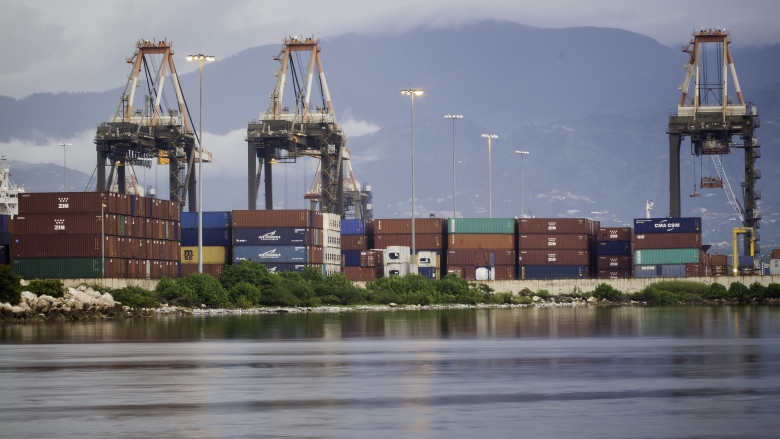
"The trade information portal will help improve the predictability and transparency of Jamaica’s trade procedures, giving the business community quick access to the country’s trade rules. The initiative is the latest government effort to improve the ease of doing business and facilitate trade for the private sector."
Audley Shaw Minister of Industry, Commerce, Agriculture and Fisheries, Jamaica
View overlooking the Kingston Port in Jamaica, September 2017. Credit: Craig F Scott/Shutterstock.
Over the last three years, the World Bank Group’s Trade Facilitation Support Program has supported Jamaica’s progress toward its trade facilitation goals in several ways:
Jamaica’s trade facilitation reforms are spearheaded by a multi-agency National Trade Facilitation Taskforce, which includes representatives from both the public and private sector. The taskforce has developed the national trade facilitation roadmap, which was endorsed by Cabinet in 2016.
Collaboration with the World Bank Group has yielded some results – with the introduction of ASYCUDA World, Jamaica reduced the time to complete documentary requirement for exports by a 24% and for imports by 28%. The government has also eliminated the requirement for some import and export licenses.
“Trade is an engine of growth that creates jobs, reduces poverty and increases economic opportunity. The World Bank Group is committed to helping Jamaica streamline its trade environment. In Jamaica, the aim is a trading system that allows for faster, fairer, more predictable and more transparent processing and connects to the global economy at the lowest costs to traders,” said Judith Green, Principal Investment Officer, the International Finance Corporation (IFC), English-speaking Caribbean.
The most recent reform supported by the Bank Group is the launch of the Jamaica Trade Information Portal. The portal makes it easier for traders and investors to comply with regulatory requirements associated with the import and export of goods. Access to information and understanding of the required regulatory procedures to import and export are major barriers to the private sector, especially for smaller firms and new market entrants.
“The trade information portal will help improve the predictability and transparency of Jamaica’s trade procedures, giving the business community quick access to the country’s trade rules. The initiative is the latest government effort to improve the ease of doing business and facilitate trade for the private sector,” said Jamaica’s Honorable Minister of Industry, Commerce, Agriculture and Fisheries, Audley Shaw.
The trade portal is a web-based system, which makes all cross-border trade regulatory information available at the stroke of a key. By publishing more than 530 procedures and forms available online, the portal makes it easier for traders and investors to comply with regulatory requirements associated with the import and export of goods. Thanks to the trade portal, trade-related regulations are more predictable and transparent, which lowers the cost of doing business.
For Jamaica’s more than 300,000 small businesses, these small improvements stand to make a difference. “The portal will be a game-changer for the business community as both importers and exporters will be able to save time and money by having critical information at their fingertips,” said Danville Walker, Chairman of Trade Board Limited.
Jamaica’s trade information portal project was supported by the World Bank Group’s Trade Facilitation Support Program, a global program that provides support for countries seeking assistance in aligning their trade practices with the WTO TFA. The program is funded by nine donor partners, including Australia, Canada, the European Commission, the Netherlands, Norway, Sweden, Switzerland, the United States, and the United Kingdom. More than 60 countries have requested assistance for since its launch in 2014, with implementation support beginning in more than 34 countries, including Jamaica